|
|
|
Sort Order |
|
|
|
Items / Page
|
|
|
|
|
|
|
| Srl | Item |
| 1 |
ID:
190941
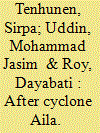

|
|
|
|
|
| Summary/Abstract |
This article compares the politics of climate change in the Sundarbans region in Bangladesh and India based on ethnographic fieldwork in four villages and among migrants from these villages in Kolkata and Khulna city by focusing on the long aftermath of cyclone Aila. The comparison highlights different policy options and framings of extreme weather events . Ten years after the cyclone, the aftermath of Aila continues in both regions we studied in Bangladesh and India, but partly for different reasons. In our study areas in Bangladesh, the aftermath of Aila reinforced the neglect of coastal livelihoods, whereas, in the communities we studied in India, Aila spurred new investments in the affected areas. By comparing how the political is interwoven with the natural, we demonstrate how Aila's lingering impacts have emerged as part of local power relationships and diverse forms of agency. We highlight the multiplicity of policy responses and people's practices not only between communities and countries facing a similar predicament but also within the communities themselves. We argue that the politics of climate change is not only about climate change policy to mitigate the impact of ecological disasters but also about the reconstruction of political agents and practices.
|
|
|
|
|
|
|
|
|
|
|
|
|
|
|
|
| 2 |
ID:
118194
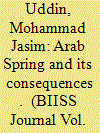

|
|
|
| 3 |
ID:
083792
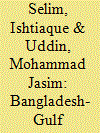

|
|
|
|
|
| Publication |
2008.
|
| Summary/Abstract |
The economic relations between Bangladesh and the oil rich Gulf Cooperation Council (GCC) countries are important for a developing nation like Bangladesh for a number of reasons. The countries of the Gulf, which are considered as one of the fastest growing economic blocs, remain the important sources of crude oil, remittances and overseas employment opportunities for Bangladesh and thus contribute significantly towards its economic development. Also, the Gulf nations have been assisting Bangladesh generously in various activities with aid and grants. In this backdrop, the current article will make an effort to assess Bangladesh's economic relations with the GCC countries. In the process of analysis, the article will look into trends and levels of remittances earned by Bangladesh from the Gulf nations. It will also focus on the current status of Bangladesh-GCC trade relations. Finally, this article will identify some challenges and prospects involved with the Bangladesh-GCC economic relationship.
|
|
|
|
|
|
|
|
|
|
|
|
|
|
|
|
| 4 |
ID:
127459
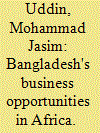

|
|
|
| 5 |
ID:
136587
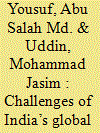

|
|
|
|
|
| Summary/Abstract |
India is emerging as a global economic power and expanding its military capabilities. Its maritime posture in the Indo-Pacific has made it an important stakeholder in the Asia-Pacific strategic ambiguity. The country is invited in almost all global forums and encouraged to play active role in the international affairs. These are some of the key indicators of India’s global emergence. By contrast, India is yet to take strong footholds in several global issues, while negotiating with international powers e.g. the USA and China. Some major challenges of the global emergence of India are its foreign policy predicaments, neighbourhood compulsions and China bogey, compulsions of energy import, limits of its soft power capabilities, internal security threats and domestic underdevelopment. In this context, the two important research questions of this paper are: which factors indicate India as an emerging global power? And, what are the challenges for India’s global emergence? The paper concludes that due to emerging economic and military power, India’s role in the international arena are increasing, but the country faces both internal and external challenges to project itself as a global power.
|
|
|
|
|
|
|
|
|
|
|
|
|
|
|
|
| 6 |
ID:
142743
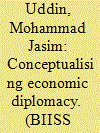

|
|
|
|
|
| Summary/Abstract |
Conceptualisation of economic diplomacy is not a straightforward task as its boundaries involve actors, issues and contents, instruments and levels of, and states (with/by) practicing economic diplomacy. Economic diplomacy concerns how a state undertakes its national policy, how it negotiates and works with different states on the policy at multiple levels and how interaction between the two is administered. Although non-state actors now-a-days are influential, states are central to economic diplomacy that refers to interactions on trade and economy at multiple levels. Thus, economic diplomacy is more than an approach or a model that promotes a state’s economic security. This paper substantiates the argument that responsibilities of actors, countries with whom actors are to negotiate, issues at various levels and instruments employed by actors to facilitate the issues in their favour are vital for a country’s economic diplomacy. Hence, the paper aims at offering a comprehensive summary of issues relevant to conceptualise economic diplomacy.
|
|
|
|
|
|
|
|
|
|
|
|
|
|
|
|
| 7 |
ID:
167804
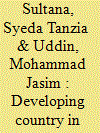

|
|
|
|
|
| Summary/Abstract |
Since the end of World War II, Bretton Woods system remains in the midst of Global Economic Governance (GEG). International Monetary Fund (IMF) was created to regulate monetary policy, International Bank for Reconstruction and Development (IBRD), then World Bank (WB) was formed to look into financial aid and lending, and General Agreement on Tariffs and Trade (GATT), then World Trade Organization (WTO) was established to regulate trade. These institutions are yet to provide much space for effective participation of developing states and are dominated by developed world like United States (US), European Union (EU), etc. Hence, a vital target of Goal 16 of Sustainable Development Goals (SDGs) is to broaden and strengthen the participation of developing states in global governance institutions. Global financial crisis and economic rise of China and India have resulted in large-scale participation of developing states in global economic governance. Being a developing country, Bangladesh will be benefitted and able to broaden its participation from exercising practices of China and India in the institutions of global economic governance.
|
|
|
|
|
|
|
|
|
|
|
|
|
|
|
|
| 8 |
ID:
151050
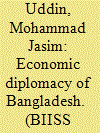

|
|
|
|
|
| Summary/Abstract |
Studies on economic diplomacy of Bangladesh examine foreign policy and external economic aspects of the country. Such studies have not yet focused on Bangladesh’s Official Development Assistance (ODA) centric economic diplomacy. Instead of assessing how much and whether ODA is required for Bangladesh’s development priorities, this paper examines the major issues of ODA-centric economic diplomacy of the country and how they are to be dealt with. The paper thus limits its scopes – what is on offer or what ODA is on supply keeping aside Bangladesh’s development needs. Rather than providing concrete policy measures for various key ministries and divisions, this paper provides some propositions that could be taken by the Government of Bangladesh (GoB) into consideration. Realising dynamism of global assistance, assessing conditionalities of ODA, lessening gap between commitment of aid and its disbursement, emphasising more on Aid for Trade (AfT) and mobilising climate financing are important issues for ODA-centric economic diplomacy of Bangladesh. No sources at multiple levels which are not tied with tough conditions should in general be left aside by the country. Priority needs to be given to countries or organisations which have already provided soft loans or grants, are still willing to do so as well as those which have emerged as new sources of assistance. The GoB requires exercising effective economic diplomacy to respond to these issues.
|
|
|
|
|
|
|
|
|
|
|
|
|
|
|
|
| 9 |
ID:
154780
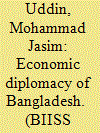

|
|
|
|
|
| Summary/Abstract |
The paper focuses on Bangladesh’s foreign trade-specific economic diplomacy. It argues that several important issues of such economic diplomacy need to be dealt with by relevant actors particularly the Government of Bangladesh and its foreign trade enhancing agencies at multi-level platforms. It finds that considering various trade uncertainties and addressing their likely adversities, reducing bilateral trade gap with major trading partners, moving towards global and regional value chains, and reducing tariff and non-tariff barriers are the most important issues of Bangladesh’s trade diplomacy. Other issues are tariff concessions, preferential tariffs, flexible rules of origin, special and differential treatment, duty free quota free market access, exploiting benefits of duty free quota free market access already provided by several states and export promotion. The paper concludes that some vital instruments can be adopted to deal with these issues, which include finalising and updating legally binding contracts, strengthening the role of Bangladeshi missions abroad, delinking trade diplomacy at multiple levels, engaging Bangladeshi diaspora, exercising consular and commercial diplomacy, increasing skills of trade negotiators and promoting ‘Brand Bangladesh’.
|
|
|
|
|
|
|
|
|
|
|
|
|
|
|
|
| 10 |
ID:
143828
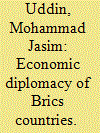

|
|
|
|
|
| Summary/Abstract |
Divergence of economic diplomacy among the BRICS (Brazil, Russia, India, China and South Africa) countries produces variation in their external economic settings. Bangladesh may not be able to follow the whole of economic diplomacy exercised by BRICS countries. Even a particular country’s entire initiatives may not be fully suitable for Bangladesh. Economic diplomacy of Bangladesh could be benefited from mutual learning and exercising best practices of BRICS countries. Diplomatic networks of Bangladesh’s Ministry of Foreign Affairs (MoFA) need to be attuned with changing global economic diplomacy. Bangladesh should realise that economic diplomacy differs based on competence and skills of diplomats engaged in international economic negotiations. Otherwise, consolidation of Bangladesh’s foreign affairs and its economic promotion would be tricky.
|
|
|
|
|
|
|
|
|
|
|
|
|
|
|
|
| 11 |
ID:
120934
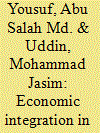

|
|
|
|
|
| Publication |
2013.
|
| Summary/Abstract |
In theory, integrating economies of various countries means unifying their policies on trade and economy as well as reducing several barriers on the two. The motivations of such economic integration are rationalising comparative advantages and increasing economic productivity. In South Asia, economic integration continues with several setbacks, even though South Asian Association for Regional Cooperation (SAARC) is aimed at promoting regionalisation with a firm belief that an effective economic integration process can forward the region towards economic prosperity and development. This paper conceptualises the meaning of economic integration, discusses the factors of economic integration in South Asia and makes an endeavour to address the difficulties of economic integration in the region. The paper concludes with the argument that the outcomes attained in regards to the integration are insignificant, although there are some arrangements that could assist the progress of South Asian economic integration.
|
|
|
|
|
|
|
|
|
|
|
|
|
|
|
|
| 12 |
ID:
113381
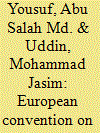

|
|
|
|
|
| Publication |
2011.
|
| Summary/Abstract |
The European Convention on Human Rights is considered as the premier document, which gives the highest degree of protection to individual rights. Since 1953, the Convention has been playing an important role in promoting the ideas of individual human rights. By contrast, the developments of globalisation are posing a number of challenges in realising individual rights. However, development of the concept of individual human rights in Europe has gone through a long process of evolution. Therefore, the objectives of this paper are to evaluate the evolution of individual rights in Europe, and to examine how far the European Convention on Human Rights is addressing the emerging realities of globalisation.
|
|
|
|
|
|
|
|
|
|
|
|
|
|
|
|
| 13 |
ID:
106063
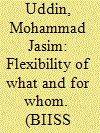

|
|
|
| 14 |
ID:
157615
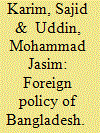

|
|
|
|
|
| Summary/Abstract |
Being placed in between low-income and lower-middle-income country
status, Bangladesh aspires to be a developed one by 2041. But there are several
emerging foreign policy challenges for the country. This paper limits its scope to
some specific challenges i.e., soft power diplomacy and image building, trade in
goods and services, attracting foreign direct investment, suiting development
assistance with development priorities, ensuring energy security, developing
transport connectivity, addressing transnational issues like water security and
maritime security, addressing climate change issues and balancing between/
among parties, interests and initiatives. Examining existing literature and
interview transcripts and undertaking interpretative approach, the paper tries
to develop its main argument - economic issues and economic diplomacy
encompassing resource mobilisation will remain crucial to formulate and
implement foreign policy agenda of Bangladesh. In mobilising resources, actors
concerned with foreign policy of Bangladesh need to work at multiple-levels
with proper understanding of internal and external dynamics, policy priorities
of vital countries as well as the organisations and instruments to make the policy
a success.
|
|
|
|
|
|
|
|
|
|
|
|
|
|
|
|
| 15 |
ID:
165533
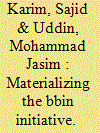

|
|
|
|
|
| Summary/Abstract |
A major thrust towards forming a new sub-regional grouping was observed when Bangladesh, Bhutan, India and Nepal, also known as BBIN, signed an agreement on 15 June 2015, titled “Motor Vehicle Agreement for the Regulation of Passenger, Personal and Cargo Vehicular Traffic between Bangladesh, Bhutan, India and Nepal”, with an ambition to facilitate seamless movement of passenger, personnel and cargo vehicles within the territories of each other. Signing of the agreement has ushered hope of a new sub-regionalism towards materializing BBIN through seamless transport connectivity. BBIN as sub-regional cooperation is still in formative stage and has to go a long way. This paper aims to evaluate three aspects. What are the developments so far within the framework? What are the challenges ahead of materializing BBIN and transport connectivity in particular? And what are the possible doings to address the concerns? The paper suggests five broad tasks, along with political commitment, to take into consideration: developing comprehensive arrangement; harmonizing standards, rules and regulations; mobilizing funds; exchanging information and research and developing an effective cooperation mechanism.
|
|
|
|
|
|
|
|
|
|
|
|
|
|
|
|
| 16 |
ID:
130729
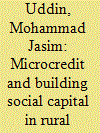

|
|
|
|
|
| Publication |
2014.
|
| Summary/Abstract |
In the 1990s, social capital and the group-based microcredit programme emerged as major planks of developmental interventions, and both approaches have underscored the necessity to mobilize social factors in the alleviation of poverty and social solidarity. The group-based microcredit model is considered an effective policy instrument for increasing women's access to financial capital and for strengthening their social capital at the local level. This study contributes to the continuing debate over how or if group-based microcredit facilitates to the formation of social capital at the local level in Bangladesh. Case studies and ethnographic (in-depth) interviews of 151 women microcredit borrowers of the Grameen Bank and the Bangladesh Rural Advancement Committee of Bangladesh were used in this study. The study suggests that the relationship between participation in the group-based microcredit programme and the facilitation of social capital at the local level is at best ambiguous. The assumed association between microcredit membership and building social capital (social networks, norms of reciprocity and collective identity and action) is much less prominent than commonly suggested by many previous scholars and development practitioners.
|
|
|
|
|
|
|
|
|
|
|
|
|
|
|
|
|
|
|
|
|